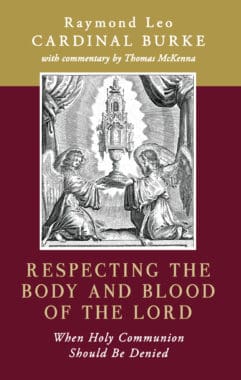Fathers of the Church and Theologians
The Fathers of the Church and approved theologians have addressed the Church’s serious concern that due respect be paid to the Most Blessed Sacrament, that souls not fall into the sin of sacrilege by receiving the Body and Blood of Christ unworthily, and that scandal not be given to the faithful by a careless administration of the Holy Eucharist to individuals who clearly are not rightly disposed, that is, who obstinately persevere in manifest serious sin. The just-cited text from St. John Chrysostom, found in Ecclesia de Eucharistia, is an excellent example.
St. Basil the Great, in his First Letter on the Canons, indicates that the man who marries his brother’s wife is not to be permitted to receive Holy Communion until he separates from her. He, likewise, declares that the widow who takes a husband after her sixtieth year is not to be admitted to Holy Communion, until “she will have renounced her impure passion.”Although little commentary is offered regarding the reason for the discipline, it seems clear that, in both cases, the reason for the prohibition is a public violation of the Church’s discipline regarding marriage and the resulting scandal in the community. The aforementioned canons of St. Basil the Great are among the fonts of canon 712 of the Code of Canons of the Eastern Churches, which corresponds to the discipline articulated in canon 915 of the Code of Canon Law.
The fonts of canon 712 of the Code of Canons of the Eastern Churches also include a text of St. Timothy of Alexandria which underlines the responsibility of the minister of Holy Communion to refuse the Blessed Sacrament to a public sinner. The question is posed: Is it permitted to give Holy Communion to a heretic who presents himself to receive amidst a large crowd? St. Timothy of Alexandria responds that it is not permitted to give Holy Communion to the heretic, even if he is not recognized in the huge crowd. He comments that the one who gives Holy Communion to the heretic in such a situation, that is, not recognizing the heretic in the crowd, “is not responsible because of the crowd and of his ignorance of the fact.” The discipline is clear. Holy Communion is to be denied to the public sinner, whether the congregation is large or small. The minister, however, is not responsible for giving the Sacrament to the known heretic whom he fails to recognize because of the size of the crowd.
St. Augustine, in Sermon 227, preaching to the newly baptized on Easter Sunday, comments on the text of St. Paul regarding worthy reception of Holy Communion. Giving the newly baptized a fuller catechesis on the Holy Eucharist, he instructs them:
What is receiving unworthily? Receiving with contempt, receiving with derision. Don’t let yourselves think that what you can see is of no account. What you can see passes away, but the invisible reality signified does not pass away, but remains. Look, it’s received, it’s eaten, it’s consumed. Is the body of Christ consumed, is the Church of Christ consumed, are the members of Christ consumed? Perish the thought! Here they are being purified, there they will be crowned with the victor’s laurels. So what is signified will remain eternally, although the thing that signifies it seems to pass away. So receive the sacrament in such a way that you think about yourselves, that you retain unity in your hearts, that you always fix your hearts up above. Don’t let your hope be placed on earth, but in heaven. Let your faith be firm in God, let it be acceptable to God. Because what you don’t see now, but believe, you are going to see there, where you will have joy without end
St. Augustine draws the attention of the newly baptized to the reality of the Eucharistic species, the glorious Body, Blood, soul, and divinity of Christ, cautioning them, lest in looking upon the species, which passes away, they fail or forget to recognize that the reality, the substance, is eternal, that is, never passes away. St. Augustine’s text recalls to mind the words of Pope John Paul II about the invisible dimension of Holy Communion, which demands that those who stubbornly remain in “manifest grave sin” be denied the Sacrament.
St. Francis of Assisi addressed the question of the indiscriminate distribution of Holy Communion in his Letter or Exhortation to the Clergy. St. Francis, first of all, lamented the lack of care for the sacred vessels and sacred linens, which hold and touch the Body and Blood of Christ, on the part of the clergy, the ministers of Holy Communion. He, then, addressed their responsibility to attend to their own worthiness and to the right disposition of those who present themselves to receive. He declared:
And besides, many clerics reserve the Blessed Sacrament in unsuitable places, or carry It about irreverently, or receive It unworthily, or give It to all-comers without distinction.
With regard to the reception of Holy Communion, St. Francis underlined two solemn moral obligations of the minister of Holy Communion: first, the obligation to be personally disposed to receive the Body and Blood of Christ worthily, and second, the obligation to give Holy Communion with discretion, that is, with attention to those who, in a public way, have made themselves unworthy to receive the Sacrament.
Key Takeaways
1. The Church Fathers and other eminent theologians throughout history have applied eucharistic discipline with vigor.
2. The “obstinate perseverance in manifest grave sin” is the primary condition for denying Communion to public sinners.
3. The Church’s ordained ministers have an obligation to assure proper respect is given to sacred vessels and the liturgy.
4. They must further administer Holy Communion with great discretion in order to avoid giving the sacrament to those who cause public scandal.
Personal Points to Ponder
Reality check: Do I obey the teaching authority of the Church in all matters, or am I a “cafeteria Catholic,” obeying those teachings that suit me while ignoring those that don’t?
Have I adopted the spirit of relativism in my view of the Eucharist? Am I convinced that the Eucharist is the Body, Blood, soul, and divinity of Christ, or do I believe that the eucharistic species are just symbols?
Have I communicated to my own family the conditions for receiving the Eucharist worthily: Confession of mortal sin, the eucharistic fast, being in the state of grace, and being in full communion with the Church?
+
This article is adapted from a chapter in
Respecting the Body and Blood of the Lord by Cardinal Raymond Leo Burke which is
available from Sophia Institute Press.
Art for this post: Cover and featured image used with permission.





